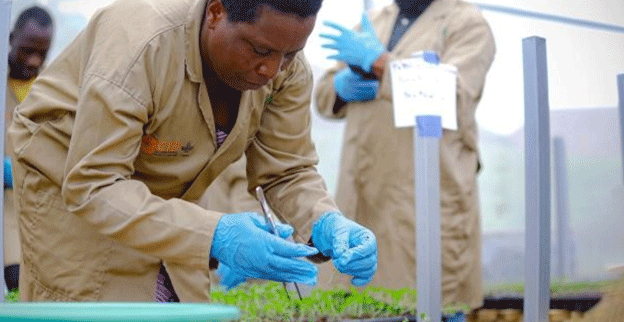In Rwanda, a significant shift is underway that could drastically boost the productivity of Irish potato farming. The Rwanda Soil Information System (RwaSIS), a pioneering soil testing technology, is poised to enhance soil fertility management and significantly increase Irish potato yields by up to 20%. This system, developed by the Rwanda Agriculture and Animal Resources Development Board (RAB), aims to improve nutrient management by providing farmers with tailored recommendations for fertilizers, optimizing their use based on the specific needs of each soil type.
The RwaSIS Initiative: A Game Changer for Potato Farming
Potatoes are a crucial crop in Rwanda, with the country being the sixth-largest producer of Irish potatoes in Africa. Despite the country’s efforts in agricultural intensification programs, potato yields remain lower than potential due to suboptimal soil management practices and improper fertilizer application. Historically, farmers have used generalized fertilizer recommendations that don’t account for the diverse agro-climatic conditions across Rwanda, often resulting in poor nutrient uptake and low returns on fertilizer investments.
The RwaSIS technology is designed to address these challenges by generating digital maps of soil nutrients and offering site-specific fertilizer recommendations. The system’s use of extensive soil testing and data analytics aims to ensure that fertilizers are applied more effectively, reducing wastage and enhancing the effectiveness of each application.
Impact on Potato Yields
According to Atanas Rusanganwa Ciamvishi, a researcher with RAB, the implementation of the RwaSIS system is expected to increase yields of Irish potatoes by 20%. In some regions, yields have already been reported to rise from 20 tons per hectare to 30 tons per hectare, thanks to more accurate fertilizer application. This improvement is especially critical as more than 50% of rural households in Rwanda farm less than 0.35 hectares of land, and optimizing these small plots can have a profound impact on overall agricultural productivity.
This system is tailored specifically to crops like Irish potatoes and rice, two of Rwanda’s priority agricultural products. It provides farmers with detailed insights into the pH, nitrogen levels, and other essential nutrients in their soil, allowing for precise interventions that foster better growth conditions.
Real-World Benefits for Farmers
Farmers across Rwanda have welcomed the initiative. Faustin Munyakayanza, a farmer from Nyamagabe District, reported that after switching to the system’s recommended fertilizers, his potato yields increased significantly. “Before, we used the same fertilizer for all types of soil, but now, after testing, my yield has risen from 20 tons to 30 tons per hectare,” he shared. This kind of yield improvement is not only financially beneficial but also helps ensure food security and economic stability for local farmers.
Moreover, the creation of a fertilizer plant in Bugesera District, capable of producing 100,000 tons of fertilizers annually, will further support this initiative. The plant, a joint venture between Rwanda Fertilizer Company and the OCP Group, aims to meet the growing demand for locally sourced fertilizers tailored to specific soil conditions.
Sustainability and Community Impact
The RwaSIS system is also a step toward environmental sustainability. By ensuring that fertilizers are applied only where needed and in the correct amounts, the technology reduces the environmental impact of excess fertilizer use, which can lead to soil degradation and water contamination. Additionally, the initiative supports Rwanda’s Sustainable Development Goals (SDGs) by boosting local agricultural production, increasing incomes, and reducing dependency on imported fertilizers.
The success of this system could serve as a model for other nations in the region, showcasing how digital technology can be harnessed to promote sustainable and productive farming practices in Africa. As Dina Borus, a researcher from the International Potato Center (CIP), emphasized, proper soil analysis is key to improving crop yields. Without it, efforts to develop better seed varieties or introduce new agricultural techniques would be in vain.
The introduction of the Rwanda Soil Information System (RwaSIS) represents a significant leap forward in agricultural technology in Rwanda. By optimizing fertilizer use through precise soil analysis, this system has the potential to revolutionize Irish potato production, increase yields by up to 20%, and support the livelihoods of thousands of farmers. Moreover, its focus on local soil conditions and sustainability offers a blueprint for agricultural development across Africa. As the technology continues to roll out, it holds the promise of not only enhancing food security but also improving the economic stability of rural communities across the country.







